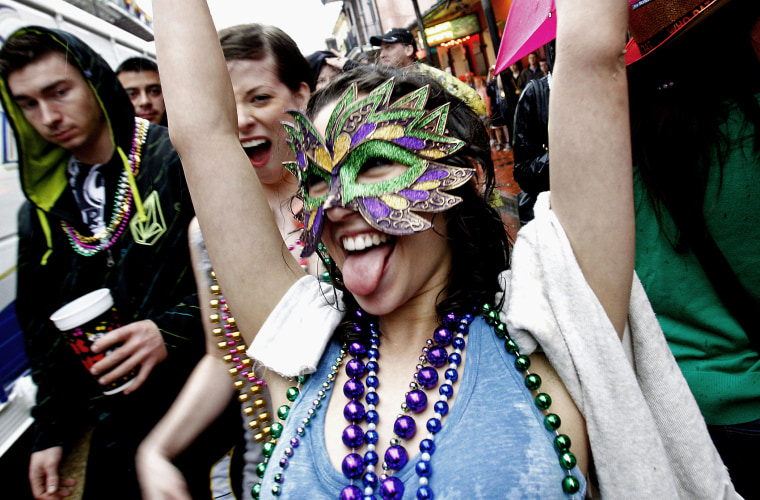What do conservatives think of liberals today?
Here’s the view from the Heritage Foundation: Liberalism creates self-indulgent, licentious hedonists willing to cede every other kind of freedom to an increasingly authoritarian government.
“Give up your economic freedom, give up your political freedom, and you will be rewarded with license,” said Heritage’s David Azerrad, describing the reigning philosophy of the left. “It’s all sex all the time. It’s not just the sex itself—it’s the permission to indulge.”
Liberals, said editor Bill Voegeli, want to create “the United States of Feeling Good About Ourselves.”
What’s more, they think that those who disagree with them ought “to imprisoned—not to be debated, to be locked up on criminal charges and imprisoned,” said the National Review’s Kevin Williamson, citing stray calls from the left to “arrest climate change deniers.”
The event at Heritage—which prides itself as being the intellectual backbone of the conservative movement—was intended to address where liberalism was headed. “Twenty-five years ago, marriage meant what it had always meant, Madonna was considered risqué, and liberals worried about mass immigration, threats to religious liberty and the vulgarity of pop music. The times, they have a-changed. And they will continue to change as the Left presses on,” Heritage said in announcing the event.
At the Tuesday’s event, a curious portrait of modern-day liberalism emerged. Liberalism meant Robert F. Kennedy Jr. and Gawker (for wanting to punish climate change deniers), Senate Democrats (for wanting to undo Citizens United), writer Matt Yglesias (for wanting to eliminate summer vacations), the term “mansplaining” (for being a symptom of P.C. extremism), and Rolling Stone magazine (for giving voice to far-left writers in “the most frivolous consumer product in the history of frivolous consumer products,” per Williamson).
But more than anything, the panelists stressed, liberalism is an idea, and a deadly one at that: a Janus-faced monster of moral relativism and authoritarianism.
“The left is intellectually dead, and where it’s heading towards is authoritarianism,” said Williamson, citing a Gawker blog post making the case for arresting climate change deniers and a “hate-filled angry crowd, screaming in rage” attending the People’s Climate Rally in New York City, as among the signs of oppression. (“As you know from history, the kind of thing that has ‘the people’s’ appended in front of it, genocide is just around the corner,” he quipped earlier.)
Given liberals’ fixation with pleasure, “I fear the next great frontier for the left will be trying to lower the age of consent,” said Azerrad, head of Heritage’s center for principles and politics.
Technology-driven popular culture helped liberals lull the masses into complacency, Azerrad continued, citing iPhones, Google Glass, massive multi-player online video games, and “year-round sports” as among the distractions that have left society vulnerable to political and economic servitude.
Azerrad equated liberalism with the dystopian future of Aldous Huxley’s “Brave New World.” “The dictator will do well to encourage that freedom. In conjunction with the freedom to daydream under the influence of dope and movies and the radio, it will help to reconcile the subject to their servitude which is their fate,” he said, quoting Huxley. “What a luminous description of the inner logic of liberalism,” he continued.
But liberalism isn’t just about pleasure-seeking and moral relativity: The oppressive nature of liberal government has crept into our popular culture as well, warns Voegeli, senior editor of the Claremont Review of Books. Coupled with the demand for tolerance and self-actualization is the growing tyranny of political correctness.
According to liberals’ worldview, “humans are too psychologically frail to maintain their self-esteem when faced with harsh criticism,” he said.
“Fairness then requires protection against not only sticks and stones, but against names, dirty looks, inappropriate laughter, white privilege, and ‘mansplaining’ that could generate a feeling of the inferiority as to their status in the community that may affect people’s hearts and minds in a way unlikely to ever be undone,” Voegeli concluded.
Nothing less than the future of freedom as we know it is at stake. “What will then be left of what Madison called ‘the vigilant and manly spirit which actuates the people of America, the spirit which nourishes freedom and in return is nourished by it’?” wondered Azerrad.
But the threats to the traditional conservative worldview don’t just come from the likes of climate-change activists or the Students for a Democratic Society. Libertarians have similarly espoused more permissive views towards drugs and sexuality, upending traditional conservatives’ views on this and other social issues.
Azerrad acknowledged as much when pressed on the matter. “In that sense the libertarian policy priorities are not helping the cause when it comes to these issues,” he said. Ben Domenech, the panel’s moderator, added that libertarians today have a greater understanding that “the breakdown of the family has been a bad thing, and that it’s led to more encroachments of government.”
The real cracks in liberalism would begin to show when existential threats begin to threaten America at home and abroad, the panelists said.
“Should the world continue to become a more dangerous place, should the homeland be threatened, or should we witness a return to 1970s levels of violent crime, I think that would put a considerable damper on prospects of liberalism,” said Azerrad, who called the liberal outlook “the luxury of a bored, prosperous and safe people.”
When crime was rampant in New York City, voters didn’t trust Democrats to be in charge, added Voegeli. “Once you had 20 years, under Giuliani and Bloomberg, where the garbage picked up, and the bills were paid, and the streets were safe, New York felt safe to go back to someone like de Blasio.”
When an audience member pointed out that Americans had elected Democrats in times of war, too, Azerrad replied that the priorities of modern-day liberals had changed. “Woodrow Wilson and FDR were not fighting for gender-neutral bathrooms,” he said.
